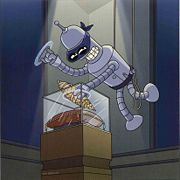Futurama, an animated television show
following the misadventures of Phillip J. Fry, a pizza delivery boy (“boy”
being a somewhat misleading title, with Fry actually being in roughly his twenties
or thirties), features as one of its protagonists an alcoholic robot named
Bender. While often Bender’s actions can be interpreted simply at the surface
level, there appears to be an undercurrent of old anti-Semitic concepts
surrounding the character. While on their own can be considered solitary
incidents perpetrated for humor, when strung together these scenes and notions
can be linked to such works as “Theophilus” and “The Jewish Boy.”
 While suffering from almost every vice imaginable,
Bender still seems to have a particular weakness for covetousness and theft. In
countless episodes the foul mouthed robot can be seen committing acts of
larceny of varying degrees, stealing anything from a single wallet to a
centuries old cigar. This sense of greed is a long standing negative stereotype
associated with the Jewish people dating back to the medieval period.
While suffering from almost every vice imaginable,
Bender still seems to have a particular weakness for covetousness and theft. In
countless episodes the foul mouthed robot can be seen committing acts of
larceny of varying degrees, stealing anything from a single wallet to a
centuries old cigar. This sense of greed is a long standing negative stereotype
associated with the Jewish people dating back to the medieval period. There is also the concept of the Jew
poisoning the well to consider. Brought up momentarily in class, this idea
follows with the notion of blaming virtually everything and anything bad on the
Jewish people. Thus when the well went bad (the cause often being a lack of
understanding of hygiene and bacterial spread) the Jews were used as a
scapegoat of sorts. However, in Futurama Bender conforms to this stereotype as
well (season 4, episode 10) when he pollutes the sewer (a sort of modern day
well) by filling it with all manner of filth and runoff.
There is also the concept of the Jew
poisoning the well to consider. Brought up momentarily in class, this idea
follows with the notion of blaming virtually everything and anything bad on the
Jewish people. Thus when the well went bad (the cause often being a lack of
understanding of hygiene and bacterial spread) the Jews were used as a
scapegoat of sorts. However, in Futurama Bender conforms to this stereotype as
well (season 4, episode 10) when he pollutes the sewer (a sort of modern day
well) by filling it with all manner of filth and runoff.
However, one of the greatest connections
between Bender and medieval anti-Semitism appears in the season four finale “The
Devil’s Hands are Idle Playthings.” Here, in an attempt to acquire greater
musical talent for his friend Fry, Bender sets up and accompanies his friend on
a meeting to see the Robot Devil. This parallels the situation in “Theophilus” when
the Jewish man convinces Tyofle to sign over his soul to the Devil in exchange
for wealth. While the situations are obviously not entirely interchangeable,
this instance along with the other similar occurrences subtly paints Bender in
such a way that he conforms to many of the medieval notions of what constituted
a Jew.
While many of these examples can simply
be taken as modern interpretations of what is evil/wicked, it is interesting to
note the apparent similarity between Bender and medieval stereotypes regarding
Jews. I imagine at least part of the cause of this is that many of the negative
traits and actions that used to be associated with the Jewish people became
less firmly tied to this particular race/faith as history and society became
less focused on painting them as the villain (and thus creating an enemy/other
for the common populace to “unite” against).
No comments:
Post a Comment